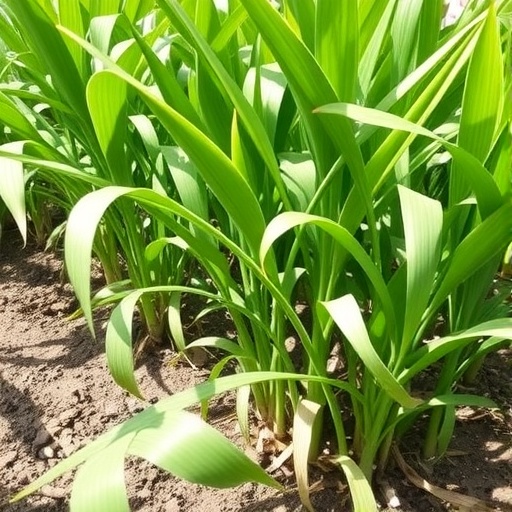In a groundbreaking study that explores the interaction between beneficial bacteria and crop plants, researchers have focused their attention on the impact of Azospirillum brasilense on micropropagated sugarcane plantlets under ex vitro conditions. Sugarcane, a vital economic crop, is known for its significant role in sugar production, biofuel generation, and as a biomass contributor in various industrial sectors. As agricultural demands intensify, understanding how to enhance the survival and growth of sugarcane plantlets becomes critical.
The team, led by esteemed researchers Mancilla-Álvarez, López-Buenfil, and Serrano-Fuentes, investigated how Azospirillum brasilense can bolster the nutrient status and overall viability of sugarcane plantlets. This study is particularly relevant because micropropagation has become a standard practice in modern agriculture, allowing for rapid multiplication of plants while ensuring genetic uniformity. However, the transfer of these plants from controlled environments to open air—ex vitro conditions—presents challenges such as environmental stress and root system development.
One of the main goals of utilizing Azospirillum brasilense is its well-documented ability to fix atmospheric nitrogen and enhance nutrient uptake for plants. This study aims to elucidate the mechanisms by which this bacterium affects sugarcane plantlets during a crucial transitional phase. The application of Azospirillum appears to support plant growth through various physiological pathways, potentially leading to improved resilience against biotic and abiotic stresses.
The research involved a comprehensive approach whereby the plantlets were subjected to a range of treatments involving Azospirillum brasilense. Observations included metrics such as root development, shoot growth, and overall plant health. Early results indicated a marked improvement in plant survival rates, underscoring the bacterium’s favorable role in the establishment of micropropagated plants when exposed to external environmental challenges.
In terms of nutrient status, the plantlets treated with Azospirillum displayed significantly enhanced levels of important macronutrients. For instance, nitrogen content was substantially higher in treated plants, demonstrating the bacterium’s efficacy in nitrogen fixation. Additionally, other nutrients critical for plant development, such as phosphorus and potassium, were also found in increased concentrations. This nutrient uptick is likely to enhance photosynthetic efficiency, ultimately contributing to better growth and productivity.
Moreover, the researchers measured growth parameters including height, leaf area, and biomass accumulation. Findings revealed that plantlets inoculated with Azospirillum brasilense exhibited superior growth traits compared to control groups. This growth superiority is attributed not only to nutrient availability but also to the beneficial rhizosphere interactions initiated by the presence of the bacteria.
Exploring the cellular mechanisms behind these observations, the study raised intriguing questions about the symbiotic relationship between sugarcane and Azospirillum. The investigation included root morphology assessments, where differences in root architecture were noted. These structural changes are vital, as a well-developed root system enhances the plant’s ability to access nutrients and water more efficiently.
Interestingly, the role of plant hormones, particularly auxins and cytokinins, was also a focal point, as Azospirillum could influence endogenous hormone levels. The interplay between bacteria and hormonal regulation may lead to translational aspects of how plants respond to their environments and develop growth strategies. Further exploration of these hormone-bacteria dynamics will be essential for understanding the broader implications of this interaction in sustainable agriculture.
As agriculture continues to face the looming challenges of climate change and population growth, the strategies emphasized in this research can pave the way for innovations in crop management practices. By leveraging the natural relationships between plants and beneficial microorganisms, farmers can potentially reduce the dependency on chemical fertilizers, promoting an eco-friendlier approach to farming.
The implications of these findings suggest that integrating Azospirillum brasilense into sugarcane cultivation practices could lead to enhanced productivity and sustainability. Encouragingly, the positive effects of bacterial inoculation extend beyond sugarcane, as similar approaches have shown promise across various crop species, establishing a broader context for future research.
As the agricultural community absorbs the findings from this seminal study, the dialogue about the integration of microbial solutions in crop production will likely gain momentum. Efforts to develop guidelines or standardized practices for using beneficial microbes like Azospirillum in diverse agricultural settings could emerge, advancing our understanding of plant-microbe interactions.
In conclusion, this pioneering research not only highlights the beneficial relationship between Azospirillum brasilense and micropropagated sugarcane but also sets the stage for further exploration into the complex world of plant microbiomes. The positive findings about plant growth, survival, and nutrient acquisition stand to revolutionize agricultural practices, ensuring that farmers are better equipped to meet the growing demands of global food production.
The journey of this research exemplifies the promise of innovative agricultural solutions rooted in biological sciences. As we cast our sights forward, anticipation builds for how these findings will be applied and adapted within real-world agricultural systems, potentially leading towards greater food security and environmental sustainability.
Subject of Research: The impact of Azospirillum brasilense on the survival, growth, and nutrient status of micropropagated sugarcane plantlets during ex vitro conditions.
Article Title: Azospirillum brasilense affects survival, growth and nutrient status of micropropagated sugarcane (Saccharum spp.) plantlets during ex vitro conditions.
Article References:
Mancilla-Álvarez, E., López-Buenfil, J.A., Serrano-Fuentes, M.K. et al. Azospirillum brasilense affects survival, growth and nutrient status of micropropagated sugarcane (Saccharum spp.) plantlets during ex vitro conditions.
Discov. Plants 2, 274 (2025). https://doi.org/10.1007/s44372-025-00357-3
Image Credits: AI Generated
DOI: 10.1007/s44372-025-00357-3
Keywords: Azospirillum, sugarcane, micropropagation, plant growth, nutrient acquisition, ex vitro conditions, agricultural sustainability.




